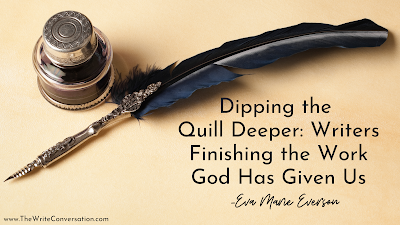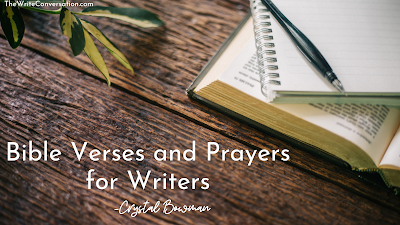Edie Melson's Blog, page 38
September 28, 2024
Expectations Can Be a Writer's Stumbling Block

by Edie Melson @EdieMelson
My soul, wait in silence for God only, For my hope is from Him (Psalm 62:5 NIV).
When I was young all I wanted to be was a writer. As a matter of fact, I actually wrote my first novel in eighth grade…long hand, with a purple ink pen. But through the years, my dream of writing drifted farther and farther from the realm of reasonable possibilities, until I finally I gave up.
But as a young mother of three kids, God revived that call. At first I was scared, but then I got excited. Oh the plans I made—I’d write Bible studies and spend my time traveling, speaking, and working for God.
I finished my first Bible study and the printer ink was barely dry before I had the manuscript in an envelope and on the way to publisher. I could see my future so clearly, and I was on fire, with plans to do great things in His kingdom. All He had to do was open this one door.
Not only did He not open that door, it seemed every other door had slammed shut and locked. It quickly became obvious that going and doing weren’t part of His call to me. Instead, the doors at home began to swing wide, as He invited me to share my story with those closest to me.
As I swallowed my pride and became obedient to act where He’d placed me, the fruit began to grow. Years later, going and doing has become part of my call, but first I’d had to learn obedience and the difference between His will and mine.
Let me pray for you.
A Prayer About Expectations
For I am confident of this very thing, that He who began a good work in you will perfect it until the day of Christ Jesus (Philippians 1:6 NASB)
Dear Lord, I had such energy and hope when I first heard you whisper that I would be a writer. My imagination and dreams soared to the apex of what that calling could be. But now I'm no longer flying. Instead I'm crawling through the mud of defeat and despair. Every word I write feels stale and like it's all been said before. Am I faithfully following Your call or should I just give up.
Help me let go of my own expectations and be a conduit for Your words. I want to share Your love through the words You have for me to write. Replace the false voices with the calling that allows me to be exactly who You made me to be.
Speak to me. Let me clearly hear Your plan for my life. Lead me into fresh ways to write about You. Fill my sentences with words that touch the minds and hearts of those who read them. Let me see the world around me with fresh eyes as You speak Your truth in unusual ways. Then guide my hands as I record what You've shown me.
Your world is a place of color, texture, sound, and smells. Renew my ability to paint pictures with words. Fill me with Your Spirit as my fingers once again fly across the keyboard. You are my inspiration and my joy. Open a pathway for that joy to spill over into my words as I write. Amen.
TWEETABLEExpectations Can Be a Writer's Stumbling Block from @EdieMelson (Click to Tweet)
 Edie Melson is a woman of faith with ink-stained fingers observing life through the lens of her camera. No matter whether she’s talking to writers, entrepreneurs, or readers, her first advice is always “Find your voice, live your story.” As an author, blogger, and speaker she’s encouraged and challenged audiences across the country and around the world. Her numerous books reflect her passion to help others develop the strength of their God-given gifts and apply them to their lives.Connect with her on her WEBSITE, through FACEBOOK, X (FORMALLY TWITTER) and on INSTAGRAM.
Edie Melson is a woman of faith with ink-stained fingers observing life through the lens of her camera. No matter whether she’s talking to writers, entrepreneurs, or readers, her first advice is always “Find your voice, live your story.” As an author, blogger, and speaker she’s encouraged and challenged audiences across the country and around the world. Her numerous books reflect her passion to help others develop the strength of their God-given gifts and apply them to their lives.Connect with her on her WEBSITE, through FACEBOOK, X (FORMALLY TWITTER) and on INSTAGRAM.Content from Soul Care for Writers, published with permission from Bold Vision Books, Inc,.
Published on September 28, 2024 22:00
September 27, 2024
Maintaining a Sustainable Writing Practice

by Zena Dell Lowe @ZenaDellLowe
Writing is a marathon, not a sprint, and it’s crucial to find a balance that keeps you productive and passionate without burning out. Your creativity is a precious resource. Ensuring sustainable practices will help you maintain both your mental and physical well-being, allowing you to write effectively over the long haul. Today, I want to give you a few tips to help yourself maintain sustainable writing habits.
Creating a Balanced Writing Schedule
First, let's talk about scheduling. Setting realistic goals and sticking to a routine that works for you is crucial. Consistency is key, whether it's writing a few hundred words a day or dedicating specific hours each week. Find a pace that you can maintain long-term. Here are three sample schedules that real writers have used:
1. Daily Word Count Goal: Aim to write 500 words every day. This approach works well for writers who thrive on daily progress and can dedicate a specific time each day to writing. For example, a writer might wake up early each morning to write before starting their day.
2. Weekly Hourly Commitment: Set aside 10 hours a week for writing. This might mean two hours every weekday, leaving weekends free for other activities. For example, schedule weekday writing sessions from 7-9 PM after dinner.
3. Monthly Milestones: Set a goal to complete one chapter or a certain number of pages each month. This method is ideal for writers with variable schedules who need flexibility. A writer might aim to finish a 20-page chapter by the end of the month.
These schedules help ensure that writing becomes a regular part of your routine, helping you make steady progress without overwhelming yourself, but it’s essential that you plan out your schedule in advance and add these writing times to your schedule.
Avoiding Burnout
Burnout is a common issue among writers, and avoiding it is essential for a sustainable practice. Burnout often stems from:
1. Overcommitment: Trying to do too much too quickly can lead to physical and mental exhaustion.
2. Lack of Variety: Focusing solely on one project without diversifying your creative input can stifle inspiration.
3. Pressure and Perfectionism: Unrealistic expectations and a fear of failure can drain your enthusiasm and energy.
To avoid burnout, try these specific strategies:Schedule Regular Breaks: Use the Pomodoro technique—25 minutes of focused writing followed by a 5-minute break. After four cycles, take a longer break. This method helps maintain productivity without exhausting your mental resources. Diversify Your Activities: Balance writing with other creative pursuits like drawing, playing an instrument, or even cooking. Engaging in different forms of creativity can inspire new ideas and keep your mind fresh.Set Boundaries: Define your work hours and stick to them. Make sure to have time for relaxation and non-writing activities. This separation helps maintain a healthy work-life balance.Manage Expectations: Set achievable goals and recognize that it's okay if some days are less productive than others. Accepting that every writing day won’t be perfect can alleviate unnecessary pressure.Connect with Nature: Spend time outdoors to refresh your mind and gain new perspectives. A walk in the park or a hike can clear your thoughts and provide renewed inspiration.
Staying Motivated
Motivation can ebb and flow, but you can keep your passion alive by connecting with a community of writers, setting small, achievable goals, and celebrating your milestones. Here are some practical guidelines to help you in these areas: Set Small, Achievable Goals: Aim to write 1,000 words a day or complete a chapter each week. These goals keep you moving forward without overwhelming you. For instance, if you’re working on a novel, breaking it down into manageable daily or weekly tasks can make the project seem less daunting.Celebrate Milestones: Reward yourself for reaching milestones. Finished a chapter? Treat yourself to a favorite snack or a night out. Celebrating small victories can keep you motivated and give you something to look forward to.Join a Community: Engaging with a community can provide support, feedback, and inspiration without taking away from your writing time. Find a group that shares your goals and interests and look for ways to encourage as well as be encouraged.
I often get asked how long it should take to complete a novel. Here’s a realistic timeline of what you might expect from start to finish:First Draft: 3-6 monthsBreak: 2 weeksRevisions: 1-3 monthsFeedback and Critique: 1-2 monthsFinal Revisions and Polishing: 1-2 months
For more experienced writers, this may be too long, and for others, way too short, but this is a reasonable timeframe to shoot for, especially for a first project. This process will keep you moving forward, while also (hopefully) ensuring ample time to thoroughly develop your story, get adequate feedback, and make sure your finished manuscript is ready for submission.
Manuscript Readiness
Know when your manuscript or screenplay is ready to share. You don’t want to share it prematurely with other professionals in the business. However, you also want to be ready to share it to receive vital feedback and input. Once you've completed several revisions and feel confident, this is when you’re ready to seek feedback from trusted peers or professionals. Here are a few key places to consider when you’re ready to share your work: Professional Critique: Submit to a script consultant or writing coach like myself for detailed feedback. This can provide you with professional insights and highlight areas for improvement. (To learn more about getting a professional manuscript critique from me, send me an email at zena@thestorytellersmission.com).Contests: Enter writing contests to gain recognition and feedback. Contests can be a great way to motivate yourself with deadlines and the possibility of winning awards.Writers Groups: Share with a writers group for peer review and support. Engaging with other writers can provide encouragement and diverse perspectives on your work.Publishing and Editing: Submit to publishers or hire a professional editor for final polishing. Ensuring your manuscript is thoroughly developed and polished increases its chances of success.
Conclusion
Sustaining a writing career requires balance, dedication, and self-care. By setting realistic goals and taking care of your mental and physical health, you can keep your creativity flowing. Implementing these strategies will help you maintain a sustainable writing practice, allowing you to continue producing work that you're passionate about without burning out.
TWEETABLEMaintaining a Sustainable Writing Practice, tips from @ZenaDellLowe on @EdieMelson (Click to Tweet)
 Zena has worked professionally in the entertainment industry for over 20 years as a writer, producer, director, actress, and story consultant. Zena also teaches advanced classes on writing all over the country. As a writer, Zena has won numerous awards for her work. She also has several feature film projects in development through her independent production company, Mission Ranch Films. In addition to her work as a filmmaker, Zena launched The Storyteller’s Mission with Zena Dell Lowe, a podcast designed to serve the whole artist, not just focus on craft. In 2021, Zena launched The Storyteller’s Mission Online Platform, where she offers advanced classes and other key services to writers. Zena loves story and loves to support storytellers. Her passion is to equip artists of all levels to achieve excellence at their craft, so that they will truly have everything they need to change the world for the better through story.
Zena has worked professionally in the entertainment industry for over 20 years as a writer, producer, director, actress, and story consultant. Zena also teaches advanced classes on writing all over the country. As a writer, Zena has won numerous awards for her work. She also has several feature film projects in development through her independent production company, Mission Ranch Films. In addition to her work as a filmmaker, Zena launched The Storyteller’s Mission with Zena Dell Lowe, a podcast designed to serve the whole artist, not just focus on craft. In 2021, Zena launched The Storyteller’s Mission Online Platform, where she offers advanced classes and other key services to writers. Zena loves story and loves to support storytellers. Her passion is to equip artists of all levels to achieve excellence at their craft, so that they will truly have everything they need to change the world for the better through story.To find out more about Zena or her current courses and projects, check out her websites at WWW.MISSIONRANCHFILMS.COM and WWW.THESTORYTELLERSMISSION.COM
Published on September 27, 2024 22:00
September 26, 2024
Want to Become a Marvelous Writer? Follow These 5 Steps

by Lori Hatcher
Do you want to be a great writer? Would you like your work to be mediocre or marvelous?
If you want to be a great writer who creates marvelous prose, you can take five giant steps forward in your craft if you evaluate your writing and address the following five elements.
Five Steps to Become a Marvelous Writer
1. First Lines
Before I submit my manuscript, I run my writing through a First Lines check. I enlist my husband to be my beta reader, but you could ask a friend, critique partner, or family member. One at a time, I read aloud the first line of each chapter. Then I ask my husband, “Does this line make you want to read more?” If the answer is no, I rewrite it.
First lines are crucial to draw the reader in, evoke curiosity, or make them think. I often use dialogue or a question to begin a devotion, blog post, or article (see above). You can also share a shocking statement or a statistic that relates to your topic. Quotes also make great first lines.
2. Last Lines
Last lines are equally important because they transition the reader from one chapter/devotion/section to the next. If you don’t have excellent last lines, your reader will put the book down and perhaps never pick it back up again.
How many times have you stayed up way too late reading “just one more chapter”? I guarantee that author wrote great last lines. An excellent last line in devotions, blog posts, or articles will either leave the reader with a satisfying conclusion and/or call to action or, in a novel, string the reader along to discover what happens next. Excellent last lines for devotions, blog posts, and articles usually circle back to something in the opening paragraph. Strong fictional last lines often reveal new information or a plot twist.
3. Dialogue
Have you read your dialogue aloud? This question doesn’t only apply to novelists. Non-fiction works should also have appropriate dialogue sprinkled in. Ask yourself (or your reader/helper) if it sounds natural. Is it true to your character? A Texas cowboy wouldn’t use Oxford-level diction, nor would a college professor snip the g’s off his verbs. If you need a primer in writing dialogue, go to a coffee shop and eavesdrop. Notice how people speak in incomplete sentences, use contractions, and interrupt each other.
4. Bible Verses and Attributions
If you quote a Bible verse, be sure to cut and paste it from online Bible software like BlueLetterBible.org. DON’T trust your memory. Bible verses are protected under copyright and must be used word-for-word, exactly as they appear in your translation of choice. Remember to note which translation you used next to the verse reference in parenthesis. Example: “Jesus wept” (John 11:35 niv).
5. Source Attribution
If you ever (and I mean ever) use someone else’s words, give them appropriate attribution. Either use an in-source notation (ex. Author David Wright, in his article, “The Death of Books,” wrote, “The rise of poor literature is rampant.”) or a footnote that includes the author, publication, publisher, and publication date or (for online sources) accessed. If you don’t give proper credit for the facts or quotes you use, you are guilty of plagiarism. Marvelous writers don’t plagiarize.
Serious writer, don’t settle for good writing. Aim for great. Run your writing through these five filters, and you’ll move away from mediocre and five steps closer to marvelous.
Now it’s your turn. What filters do you use to ensure that your writing is excellent? Share your tips below and join the conversation.
TWEETABLEWant to Become a Marvelous Writer? Follow These 5 Steps from Lori Hatcher on @EdieMelson (Click to Tweet)
 Lori Hatcher loves to inspire and equip others by sharing high-impact stories for spiritual transformation. A popular women’s ministry speaker and writing/speaking instructor, Lori writes for Our Daily Bread, Guideposts, Revive Our Hearts, and Crosswalk.com. Check out her latest devotional, A WORD FOR YOUR DAY: 66 DEVOTIONS TO REFRESH YOUR MIND, from Our Daily Bread Publishing. Connect with her at LORIHATCHER.COM or on FACEBOOK.
Lori Hatcher loves to inspire and equip others by sharing high-impact stories for spiritual transformation. A popular women’s ministry speaker and writing/speaking instructor, Lori writes for Our Daily Bread, Guideposts, Revive Our Hearts, and Crosswalk.com. Check out her latest devotional, A WORD FOR YOUR DAY: 66 DEVOTIONS TO REFRESH YOUR MIND, from Our Daily Bread Publishing. Connect with her at LORIHATCHER.COM or on FACEBOOK.
Published on September 26, 2024 22:00
September 25, 2024
Tips for Keeping the Details Straight in What You're Writing

by Henry McLaughlin @RiverBendSagas
One of the greatest challenges writers face is keeping our story material straight and organized.
This whacked me upside the head when I started working on the fourth book in my Riverbend Saga series. Why am I writing a fourth installment you might ask.
I wondered that myself. The third book was released a few years ago, and I thought I was finished. The storylines were all wrapped up and, without giving a spoiler alert, I thought all the characters were settled.
Let this be a lesson to you all—be careful when you create strong-willed characters. They are fantastic in the story. They move it forward as they pursue their goals. Tension and suspense mount because as the reader, you’re caught up in the adventure with them. It’s all great.
But I discovered a downside. These wonderful characters can turn into nags. And I mean that in the kindest way possible. One of my strongest, and most popular characters in the Riverbend books is Rachel. Feisty. Spunky. Determined. Smart. Loving.
At the end of the third book, I hinted she might possibly be pregnant. A kind of happy ending for her and Michael.
Well, Rachel had other ideas. For a year or so, Rachel reminded me several times, with a finger stabbing my shoulder, and sharply spoken words: “You left me pregnant!” At least once she said, “Even elephants aren’t pregnant for as long as I’ve been pregnant.”
So, book four was birthed—yes, a definite pun intended.
After completing five or so chapters, I discovered my memory of the first three books is not as sharp as I thought it was. I couldn’t remember character names or descriptions. The layout of the town was fuzzy. I had to stop and research my previous books. Kind of embarrassing.
Here are some of the things I’ve done to keep it all straight. I pray it may help you organize your own writing projects.
I’m a pantser. I don’t outline. I follow a story idea through my characters. I listen to them. After all, this is their story. I’m just the scribe. They lead me on the journey of their story. I encounter their challenges and victories, their emotions and their dreams as they do.
The first thing I did was create a spreadsheet where I listed every character in every book. I marked which books they were in. I added a brief description of who they were and where they fit in with the main characters.
Scrivener is my main writing software. I appreciate how it keeps all my background information on the same screen as my manuscript. For me, the two most important tools in the software are character sketches and setting sketches. A third equally important tool is the capability to track the plot and timeline. All are very helpful for quick reference.
The character sketch contains more information than my character spreadsheet. Plus, the sketches are unique to that book. I record physical descriptions, motivations, relationships, goals, and other information I might need. I’m only using a spreadsheet because I’m tracking numerous people over several books.
The setting sketch helps me keep the variety of settings in the book clear without having to build a whole lot of stuff from scratch. It’s really kind of fill in the blanks. And you can add your own blanks if you need to. With it I can track the different towns involved, the settings in Riverbend itself, and even a character’s house or ranch.
It took me about nine to ten hours to establish these resources over the course of a few days. Less than a week.
Now, the writing is flowing smoothly. My characters continue to surprise me and challenge me. But it’s good to be working with them again and listening to them tell a story much better than I could ever imagine.
So, that’s how I’ve learned to keep things straight. This same system works on stand-alone novels as well as series.
What are some things you’ve learned about keeping everything straight while working on a project?
TWEETABLETips for Keeping the Details Straight in What You're Writing from Henry McLaughlin (@RiverBendSagas) on @EdieMelson (Click to Tweet)
 Henry’s debut novel, Journey to Riverbend, won the 2009 Operation First Novel contest.
Henry’s debut novel, Journey to Riverbend, won the 2009 Operation First Novel contest.Henry edits novels, leads critique groups, and teaches at conferences and workshops. He enjoys mentoring and coaching individual writers.
Connect with Henry on his BLOG, TWITTER and FACEBOOK.
Published on September 25, 2024 22:00
September 24, 2024
51 Tips to Help Market Your Book

by DiAnn Mills @DiAnnMills
1. Practice good marketing, promotion, and social media by learning and meeting the needs of readers and followers.
2. Use a spreadsheet to begin marketing and promotion at the proposal stage to after release.
3. Develop a long bio.
4. Develop a 100-word bio.
5. Develop a 50-word bio.
6. Invest in a professional website.
7. Invest in a professional headshot and maintain the same or similar photo for all promotions and visibility.
8. Establish and engage followers on Facebook.
9. Establish and engage followers on X (formerly Twitter).
10. Establish an author page on Amazon.
11. Establish a BookBub account and use it.
12. Establish a Goodreads account and participate.
13. Establish a Pinterest account and participate.
14. Establish an Instagram account and participate.
15. Establish, maintain, value, and encourage a Launch Team.
16. Create and maintain a blog—or post regularly on a highly-respected blog(s).
17. Schedule guest blogs and offer book giveaways.
18. Create and maintain a brand that reflects your writing, genre, style, voice, and expertise.
19. Create memes that raise interest in your book’s content and themes.
20. Create social media posts, blog content, images, hashtags, and speaking content before your book is released.
21. Create a giveaway for the new book in which the participants are subscribers to your email list.
22. Arrange book signing/speaking events and offer a valuable incentive to potential readers like book swag and/or book retailer gift card.
23. Create bookmarks and distribute them at retail sites.
24. Create Pinterest boards that rise from themes in your book. Keep the board “secret” until close to book release.
25. Create personal topic Pinterest boards for continued follower interest.
26. Create a book club kit and post it on your website. Develop unique resources for your book: games, word games with the book’s theme, menu options, insider information, decoration ideas, and a contact form for those who want you to present to the group via online/zoom.
27. Link your blog to Goodreads.
28. Link your blog to LinkedIn.
29. Link your social media platforms on your website.
30. Add each book’s cover, blurb, links to purchase options, book trailer, author interview video, podcasts, and first chapter to your website.
31. Develop speaking topics from your book’s theme, setting, or research.
32. Develop a press kit and post it on your website. Use for print and online media.
33. Launch a pre-order campaign with a cover and teaser first scene.
34. Partner with other writers to cross-promote.
35. Organize virtual book tours with giveaways that include other writers.
36. Consult with your publisher about ways to market and promote.
37. Inform your publisher about all marketing and promotion efforts.
38. Host a Facebook live party with giveaways.
39. Take pics that reflect your book research, author engagement, setting, and theme. Use on social media.
40. Use Advance Reader Copies or Net Galley to encourage reviews.
41. Research successful blog tours and hire or do your own.
42. Record short videos for social media about your book.
43. Host a podcast or seek a guest spot on a respected podcast.
44. Consider having book’s cover designed into a puzzle or playing cards for giveaways.
45. Ensure proper keywords on search engines for search engine optimization.
46. Create pre-order banners for all social media platforms promoting your book then update when it releases.
47. Video you and your book on a sightseeing trip.
48. Show character clothing.
49. Post recipes if applicable to the book.
50. Reach out to book reviewers for your genre.
51. Start a private Facebook reader group where fans can discuss your books, share their thoughts, and interact with you directly. This can foster a loyal community and encourage word-of-mouth promotion.
No need to list, but always say thank you and enjoy what you do!
TWEETABLE51 Tips to Help Market Your Book from @DiAnnMills on @EdieMelson (Click to Tweet)
 DiAnn Mills is a bestselling author who believes her readers should expect an adventure. She creates action-packed, suspense-filled novels to thrill readers. Her titles have appeared on the CBA and ECPA bestseller lists; won two Christy Awards; and been finalists for the RITA, Daphne Du Maurier, Inspirational Readers’ Choice, and Carol award contests.
DiAnn Mills is a bestselling author who believes her readers should expect an adventure. She creates action-packed, suspense-filled novels to thrill readers. Her titles have appeared on the CBA and ECPA bestseller lists; won two Christy Awards; and been finalists for the RITA, Daphne Du Maurier, Inspirational Readers’ Choice, and Carol award contests. She is the former director of the Blue Ridge Mountain Christian Writers Conference, Mountainside Marketing Retreat, and Mountainside Novelist Retreat with social media specialist Edie Melson. Connect here: DiAnnMills.com
Published on September 24, 2024 22:00
September 23, 2024
Dipping the Quill Deeper: Writers Finishing the Work God Has Given Us

by Eva Marie Everson @EversonAuthor
I said I wasn’t going to do it. But then I did it. Then I stopped doing it. And I said I wasn’t going to do it again. But then I did it again. Once again, I stopped doing it. Lo and behold, when the opportunity came up, I decided to do it again.
What am I speaking about?
Getting my bachelor’s degree in biblical exposition.
The process went like this: Years ago, I began working toward another theological degree. But my work as an author, as the (then) President of Word Weavers International, the Director of Florida Christian Writers Conference, a frequent speaker, and (yes) my family and personal life simply got in the way. I couldn’t do it all, no matter how badly I wanted the end result.
So, I quit.
Some time later, the school reached out to me and said, “But you’re almost done! Don’t you want to finish?” With the work being online (or virtual), I figured, sure. Why not? And so I started back. But, once again, with a heavy workload and family obligations, I. Just. Couldn’t. Do. It.
So, I quit. Again.
And then the school reached out to me one more time. “You’re so close!” I agreed that I was. “We have a new program,” they said. “Check it out.” And so, I did. And I liked what I saw. I not only wanted the end result, I found myself wanting the path to the end result. Because, let me just tell ya, I love, love, love reading and studying God’s Word.
So, I said, “I’m back!”
Two of the most recent courses have centered on the books of Ezra and Nehemiah, both books I know well. Or so I thought. Isn’t that the thing about the Bible? The more you read it, the greater the nuggets discovered within it.
So, check this out—in 538 B.C., Zerubbabel (under Persian King Cyrus) led 50,000 former Jewish exiles back to Jerusalem. They rebuilt the temple of the Lord, but only after a 20-year struggle (at some point, their work was stalled, but they eventually finished).
Then, in 458 B.C., Ezra (under Persian King Artaxerxes) led 2,000 Jewish men and their families back to Jerusalem. There he confronted the spiritual disobedience of the people and reestablished worship at the temple. Ezra had some difficult issues to face with the people, but he did so from a strong spiritual place.
Finally, in 445 B.C., Nehemiah (under the Persian King Artaxerxes), led a small group of exiles back to Jerusalem to rebuild the wall around the city. The opposition was intense and those who wanted to stop the work—even though it was ordered and supported by the king himself—used every trick in the book (so to speak) to stop the work.
If you’re doing the math, you can see that the opposition toward Zerubbabel, Ezra, and Nehemiah lasted over 100 years. One hundred years of “take this” and “take that.” But these three men, and those who followed them, didn’t stop until the work was finished.
(Point taken, Lord. Point taken.)
It’s easy, isn’t it, when things get tough, or life gets too busy, to stop in the work God has called us to. Even when we know He—the Creator of the Universe and the One we want to please the most—has called us to it . . . it’s just much easier to lay the work down and say, “Well, I coulda . . .”
Here’s the other point I’d like to make—if you read the books of Ezra and Nehemiah, you’ll discover the one thing that rooted these men (and the people who worked beside them) in their commitment to finish whatever God had placed before them to do was prayer and praise. They were committed to prayer, to studying God’s Word, and to living lives dedicated to what they found therein. They were equally committed to raising their hands and their voices in thanksgiving.
Writer, if God has called you to a work, do it and do it well. Pray against the opposition and praise the One who gives you strength, talent, and the desire to complete the task.
See you at graduation 😊.
TWEETABLEDipping the Quill Deeper: Writers Finishing the Work God Has Given Us @EversonAuthor on @EdieMelson (Click to Tweet)
 Eva Marie Everson is the CEO of Word Weavers International, the director of Florida Christian Writers Conference, and the Director of Contests for Blue Ridge Mountain Christian Writers Conference. Her latest work, Ahoti: A Story of Tamar, co-written with Israeli bestselling author Miriam Feinberg Vamosh, released May 14, 2024 (Paraclete Press/Raven Fiction). For more information about Eva Marie, go to www.EvaMarieEversonAuthor.com.
Eva Marie Everson is the CEO of Word Weavers International, the director of Florida Christian Writers Conference, and the Director of Contests for Blue Ridge Mountain Christian Writers Conference. Her latest work, Ahoti: A Story of Tamar, co-written with Israeli bestselling author Miriam Feinberg Vamosh, released May 14, 2024 (Paraclete Press/Raven Fiction). For more information about Eva Marie, go to www.EvaMarieEversonAuthor.com.
Published on September 23, 2024 22:00
September 22, 2024
A Few of My Favorite Things—Tips and Tools for Writers

by Ane Mulligan @AneMulligan
Go ahead, admit it. I've got you singing, right? But these favorite things are the ones I'm forever gathering—new tips and tools for my writer's toolbox.
I don't think I'll ever "arrive" at a place where I don't need continual education. Lately though, I find I'm incorporating many of these new ways of writing into the first draft of a WIP.
That delights me. It means they’ve become natural to me like using a noun and a verb in a sentence. I used to work hard at incorporating those nuances in editing.
Because I always want each new book to be better than my last one, I read so many writer's blogs, gathering tidbits and tips. Some are new, others I already do, but the blog offers a reminder of something I might have forgotten.
And that's what frustrates me—those I've forgotten or let slip away.
Will I ever get to the point where it flows out perfectly? I doubt it. Well, maybe in Heaven, except I think I'll be too distracted by God's glory to write.
Some of my favorite writing tools: Using the 5 senses Power words (this is a new tool for me—think beyond verbs)Incorporating subtext Foreshadowing A plot twist nobody sees coming
I love to twist a cliche or metaphor. Even better is writing a scene that in itself is a metaphor—something I'm working on but haven't mastered yet.
How about you? What are some of your favorite tips and tools?
TWEETABLEA Few of My Favorite Things—Tips and Tools for Writers from @AneMulligan on @EdieMelson (Click to Tweet)
 Ane Mulligan lives life from a director’s chair, both in theatre and at her desk creating novels. Entranced with story by age three, at five she saw PETER PAN onstage and was struck with a fever from which she never recovered—stage fever. One day, her passions collided, and an award-winning, bestselling novelist emerged. She believes chocolate and coffee are two of the four major food groups and lives in Sugar Hill, GA, with her artist husband and a rascally Rottweiler. Find Ane on her website, Amazon Author page, Facebook, Instagram, Pinterest, The Write Conversation, and Blue Ridge Conference Blog.
Ane Mulligan lives life from a director’s chair, both in theatre and at her desk creating novels. Entranced with story by age three, at five she saw PETER PAN onstage and was struck with a fever from which she never recovered—stage fever. One day, her passions collided, and an award-winning, bestselling novelist emerged. She believes chocolate and coffee are two of the four major food groups and lives in Sugar Hill, GA, with her artist husband and a rascally Rottweiler. Find Ane on her website, Amazon Author page, Facebook, Instagram, Pinterest, The Write Conversation, and Blue Ridge Conference Blog.
Published on September 22, 2024 22:00
September 21, 2024
A Cross Road in the Life of a Writer

by Edie Melson @EdieMelson
Then Jesus said to his disciples, If any of you want to be my followers, you must forget about yourself. You must take up your cross and follow me. If you want to save your life, you will destroy it. But if you give up your life for me, you will find it (Matthew 16:24-25 CEV).
“Take my life and let it be, consecrated all to Thee.”
The words to that old hymn recently transported me back in time. Many years ago, I hit a crossroad with God. I knew He’d called me to write—in my heart I knew—but all around me everything was rejection and heartache. I’d been so thrilled when God whispered that calling. It felt . . . right. I’d barely heard the words when I began mapping out my future. I knew He’d want me to write Bible studies and teach and speak—bringing His Word to His people. My vision was full of me and how I’d impact His kingdom. But looking back I can see I was focused on my glory, not His.
Then came the struggle. And finally that night when my dream, and what I thought God had promised, lay in shattered pieces around me. I spoke my frustration to God that dark evening out loud, and shook a metaphorical fist toward Heaven. “I didn’t ask for this gift of writing—this insane compulsion. Why make me suffer for it?”
Even before the echo of my cry died away I knew it for the lie it was. I remembered an earlier time in my life, when I’d committed myself to God, asking Him to do what He willed with my life. And now I complained because He had? I’d known what that commitment meant and the suffering that would come. How could I have ever thought suffering would be easy or martyrdom pleasant?
That night at the crossroad, I surrendered to a different writing future. My new future was one where I didn’t second guess God’s plan, but kept my gaze locked tightly on Him. I chose to trust Him and believe that He knew what was best for me, no matter what.
That was the night I died—died to myself and my own dreams of glory—and began to learn how to live for Him. It was when I learned that to be truly His in every way means giving up my every way.
I didn’t know if God would resurrect me as a writer. Only time held that answer, but I had to come to a point where I committed to His will—even for my writing. Did I care? Oh I cared; I desperately cared. My dreams, my hopes, my ambitions had been tied to my writing. But I was making the decision to turn all of that over. From that point on, I vowed that I’d do my very best to turn my ambition into emptying myself so that I could be filled with God.
I changed my wish for God to make me look good because I work for You into make me look any way You choose because I’m totally Yours.
It was a true Cross Road.
So how has that worked out? The story isn’t finished, but many years have passed since that dark night. The journey hasn’t been easy, and my publishing career doesn’t look much like I originally imagined. My life hasn’t taken the path I thought—it’s taken one that’s been infinitely richer than I could have ever imagined.
God has taken me places—physically and spiritually—I wouldn’t have dared to dream about, and I dreamed some pretty big stuff. Only He could have accomplished so much.
Many of you are where I was—second guessing your calling because it doesn’t look like what you thought it would. I urge you to stay the course. Let me Pray for you.
A Prayer for a Writer to Move Forward
Surely the Sovereign Lord does nothing without revealing his plan to his servants the prophets (Amos 3:7 NIV).
Dear Lord, I find myself at a decision point in my writing life. I heard Your call and began this journey. I felt like I had a clear vision of where we were headed. But although I see the goal, it might as well be a million miles away. There are too many obstacles between me and where I thought You wanted me to go. Show me where I’ve gone wrong. I’m ready to stop striving and listen to what You have for me.
I feel like I’ve been wandering in the wilderness and unable to make any progress. Today I’m asking for clarification. I need to know that all the time I’ve spent hasn’t been wasted. Give me concrete examples of how You’ve used this journey.
I had such high hopes and none of them have come to pass. Show me where I need to readjust my expectations. I’m tired of being so focused on what I thought was my destination, that I’ve lost sight of You. I haven’t meant to drift away from You, but every time I try to make forward progress, I end up leaving Your side. Help me understand what’s happening. Empty me of my expectations—and even my dreams. Give me a clear vision of how to walk with You through this writing journey. Amen.
TWEETABLEA Cross Road in the Life of a Writer from @EdieMelson (Click to Tweet)
 Edie Melson is a woman of faith with ink-stained fingers observing life through the lens of her camera. No matter whether she’s talking to writers, entrepreneurs, or readers, her first advice is always “Find your voice, live your story.” As an author, blogger, and speaker she’s encouraged and challenged audiences across the country and around the world. Her numerous books reflect her passion to help others develop the strength of their God-given gifts and apply them to their lives.Connect with her on her WEBSITE, through FACEBOOK, X (FORMALLY TWITTER) and on INSTAGRAM.
Edie Melson is a woman of faith with ink-stained fingers observing life through the lens of her camera. No matter whether she’s talking to writers, entrepreneurs, or readers, her first advice is always “Find your voice, live your story.” As an author, blogger, and speaker she’s encouraged and challenged audiences across the country and around the world. Her numerous books reflect her passion to help others develop the strength of their God-given gifts and apply them to their lives.Connect with her on her WEBSITE, through FACEBOOK, X (FORMALLY TWITTER) and on INSTAGRAM.Content from Soul Care for Writers , published with permission from Bold Vision Books, Inc,.
Published on September 21, 2024 22:00
September 20, 2024
A Workout Plan to Help Writers Stay Healthy

by Edie Melson @EdieMelsonWe all know the importance of staying in shape. Today I’m going to give you some workout tips to help you keep your writing life in shape. While physical conditioning is important, equally vital is our spiritual and emotional well-being.
After all our goal is a sustainable writing life, filled with joy and the ability to do what it takes to be our best—no matter what comes.
A Workout Routine for WritersDeep Knee Bends: I’m at my healthiest—physically, spiritually, and emotionally—when I make daily conversations with God a priority. But these aren’t the only type of deep knee bends that keep us in good shape. There is also a healthy humility that keeps us in good condition. By acknowledging other can be correct and even deserve a position ahead of us, we remove a lot of stress from our lives.
Sit Ups: This is the one where you sit up and take notice of what’s going on around the publishing world—in your local community and world wide. A healthy writer is aware of the trends and works out regularly to stay aware of what’s happening.
Strength Training: Where do you have the strongest publishing foundation? That’s where you need to build from. It could be that you’re active in a local community. If that’s the case, stay active and look for ways to serve while you grow. What can those around teach you and what can you teach them?
Maybe you have articles and blogs already visible. What topics seem to hit best? What topics and types of writing do you love best? Know the answers can help determine your focus.
Finally, what are your actual writing strengths? Are you good at descriptions, story telling, editing? Continue to got in your strength and another skills that complement what you already do well.
Hurdles: Look at the obstacles ahead of you. If you're struggling with something take a run at it. Learn a new skill to keep your writing life healthy.
Sprints: Don’t despise the short spans of time during your day. Some of us love to have uninterrupted hours before we dig into a writing project, but that often isn’t an option. Life is crazy these days and if we waited for perfect conditions, we might never get any writing done. Train for those short sprints. Get used to scribbling down some words when you have time and you’ll be amazed at the goals you’ll be able to achieve.
Endurance Training: Remember this thing called writing takes time—overall—it’s a marathon. Take small consistent steps and you’ll find success every time.
Cardio: Make sure you follow God’s heart in all you do. Let Him shape your passion and bring truth into your writing life. By giving Him your heart you’ll be protected from those devastating injuries like jealousy, discouragement, and frustration. Those can derail the healthiest writer if we’re not prepared.
Stretching: Don’t neglect stretching when it comes to writing. We all need to stay limber when it comes to this wordy life. Things change—often quickly and unexpectedly—and the writer who is willing to stretch and grow will be able to stay in the race.
Now it’s your turn, what exercise would you add to this writing workout routine?
Don’t forget to join the conversation!Blessings,Edie
TWEETABLE A Workout Plan to Help Writers Stay Healthy from @EdieMelson (Click to Tweet)
 Edie Melson is a woman of faith with ink-stained fingers observing life through the lens of her camera. No matter whether she’s talking to writers, entrepreneurs, or readers, her first advice is always “Find your voice, live your story.” As an author, blogger, and speaker she’s encouraged and challenged audiences across the country and around the world. Her numerous books reflect her passion to help others develop the strength of their God-given gifts and apply them to their lives.Connect with her on her WEBSITE, through FACEBOOK, X (FORMALLY TWITTER) and on INSTAGRAM.
Edie Melson is a woman of faith with ink-stained fingers observing life through the lens of her camera. No matter whether she’s talking to writers, entrepreneurs, or readers, her first advice is always “Find your voice, live your story.” As an author, blogger, and speaker she’s encouraged and challenged audiences across the country and around the world. Her numerous books reflect her passion to help others develop the strength of their God-given gifts and apply them to their lives.Connect with her on her WEBSITE, through FACEBOOK, X (FORMALLY TWITTER) and on INSTAGRAM.
Published on September 20, 2024 22:00
September 19, 2024
Bible Verses and Prayers for Writers

by Crystal Bowman
As Christian writers, we cannot write without partnering with the Holy Spirit. As we commit our writing and publishing to God, I pray these Bible verses and prayers will be an encouragement for you today.
11 Bible Verses—With Prayers—For Writers
1. He will give you all you need from day to day if you live for him and make the Kingdom of God your priority. Matthew 6:33-34Lord, help me to trust you day by day rather than worry about the future. Help me to make your Kingdom my priority as I write for you.
2. Do not be anxious about anything, but in everything, by prayer and petition, with thanksgiving present your requests to God. And the peace that passes all understanding will guard your hearts and minds in Christ Jesus. Philippian 4:6-7Dear Father, please give me opportunities to share with others what you have put on my heart. Help me to not be anxious but fill me with your peace. Thank you for all you are doing in my life.
3. So if you are suffering according to God’s will, keep doing what is right, and trust yourself to the God who made you, for he will never fail you. 1 Peter 4:19Lord, I know you will never fail me. Even when times are hard and contracts don’t come, help me to trust you completely.
4. I will thank you, Lord, with all of my heart; I will tell of all the marvelous things you have done. I will be filled with joy because of you. I will sing praises to your name, O most high. Psalm 9:1Lord, help me to be joyful and full of praise for what you have done in my life. Help me to have a positive attitude and be filled with gratitude. Help me to be thankful for every opportunity to speak and write the words you give me.
5. Eye has not seen, nor ear heard, nor have entered into the heart of man the things which God has prepared for those who love him. 1 Corinthians 2:9Lord, I know you have good plans for those who trust in You. Help me to be patient and trust you as your plans unfold.
6. This is the day the Lord has made. I will rejoice and be glad in it. Psalm 118:24Lord, each new day is a gift from You. Help me to receive this day with joy and thanksgiving and protect my mind from negative thoughts.
7. The Lord says, “I will guide you along the best pathway for your life. I will advise you and watch over you.” Psalm 32:8Lord, please continue to guide and direct my life, and show me the path you have for me.
8. Commit everything you do to the Lord. Trust him and he will help you. Psalm 37:5Lord, help me to submit to your will and to commit everything to You. Give me the physical and emotional strength I need today.
9. When the Holy Spirit controls our lives he will produce this kind of fruit in us: love, joy, peace, patience, kindness, goodness, faithfulness, gentleness, and self-control. Galatians 5:22-23.Father, fill me with your Holy Spirit and help me to be controlled by your Spirit so that I may produce the kind of fruit that honors you.
10. We demolish arguments and every pretension that sets itself up against the knowledge of God, and we take captive every thought to make it obedient to Christ. 2 Corinthians 10:5Lord, help me to take captive those thoughts which are not from you. Help me to keep my mind set on you and to let go of doubt and fear and worry.
11. May the words of my mouth and the meditation of my heart be pleasing to you, O Lord, my rock and my redeemer. Psalm 19:14Lord, may every word I write and every word I speak bring you honor and glory in the name of Jesus.
What are your go-to Bible verses that you can add to this list? Please share them!
TWEETABLEBible Verses and Prayers for Writers from Crystal Bowman on @EdieMelson (Click to Tweet)
 Crystal Bowman is an award-winning, bestselling author of more than 100 books for children and families. She also writes lyrics for children’s piano music and is a monthly contributor to Clubhouse Jr. Magazine, Arise Daily, and Christian Children's Authors. She enjoys coaching children's writers as well as teaching at writers conferences. When she is not writing or speaking, she likes going for walks and spending time with her huggable grandkids. She and her husband live in Michigan and Florida and try to avoid snowstorms.
Crystal Bowman is an award-winning, bestselling author of more than 100 books for children and families. She also writes lyrics for children’s piano music and is a monthly contributor to Clubhouse Jr. Magazine, Arise Daily, and Christian Children's Authors. She enjoys coaching children's writers as well as teaching at writers conferences. When she is not writing or speaking, she likes going for walks and spending time with her huggable grandkids. She and her husband live in Michigan and Florida and try to avoid snowstorms.WWW.CRYSTALBOWMAN.COMWWW.FACEBOOK.COM/CRYSTAL.BOWMANWWW.FACEBOOK.COM/CRYSTALJBOWMANWWW.INSTAGRAM.COM/CRYSTALBOWMANAUTHOR
Published on September 19, 2024 22:00



